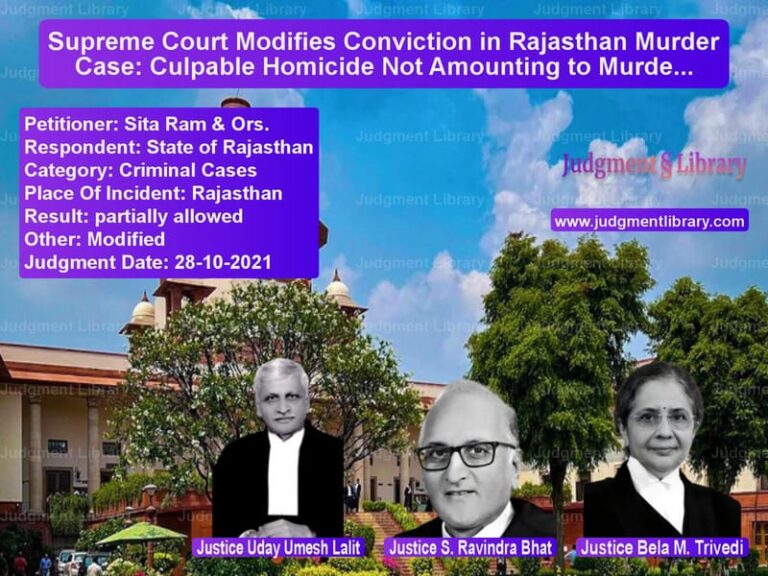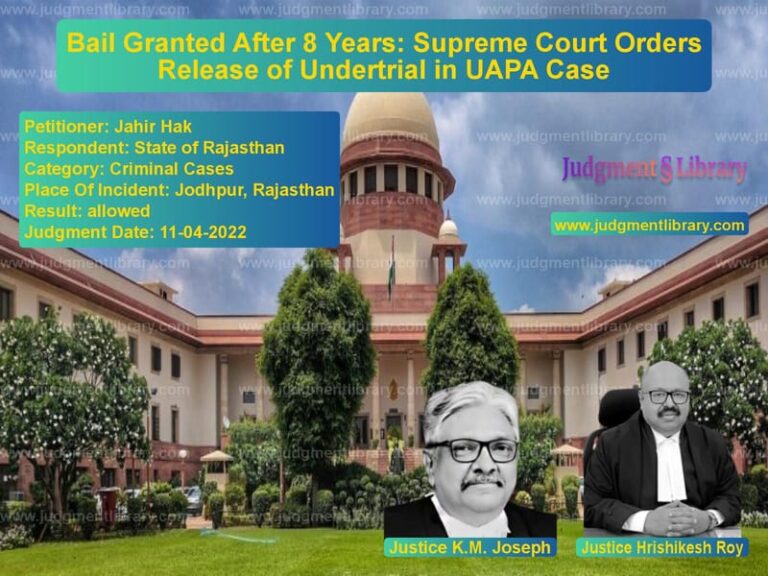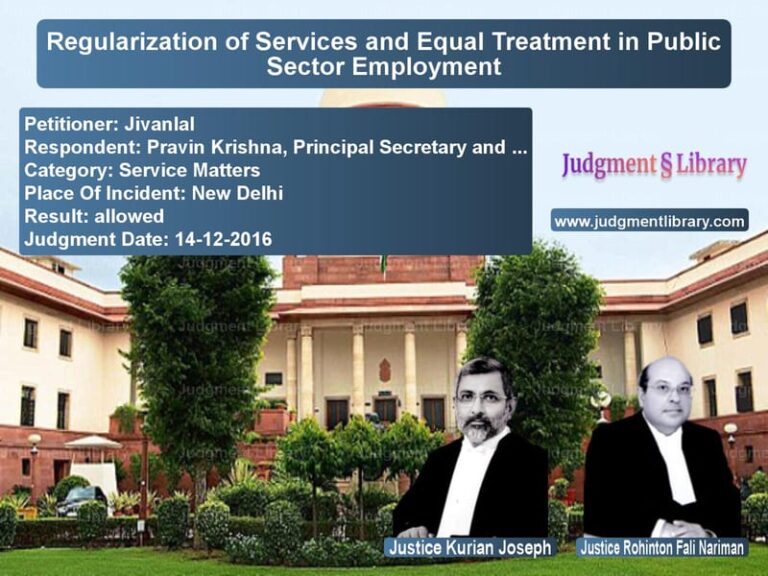Supreme Court Orders Fresh Hearing in Wrongful Termination Case Against District Cooperative Bank
The case of Hriday Shankar Tiwari vs. District Cooperative Bank Ltd. & Ors. revolves around the wrongful termination of a bank employee and the denial of his right to a fair hearing. The Supreme Court ruled in favor of the petitioner, Hriday Shankar Tiwari, setting aside the High Court’s dismissal of his writ petition and directing a fresh hearing to ensure that the principles of natural justice are upheld.
Background of the Case
Hriday Shankar Tiwari, the appellant, was employed by the District Cooperative Bank Ltd. in Uttar Pradesh. On August 2, 2000, he was served with a termination order, dismissing him from service without a proper inquiry. Feeling aggrieved by this decision, he filed a writ petition before the High Court, challenging his termination and requesting reinstatement with back wages.
The High Court, however, dismissed his writ petition without granting him a proper hearing. This led the appellant to approach the Supreme Court, arguing that his termination violated the principles of natural justice and that he had not been given an opportunity to defend himself.
Key Legal Issues Considered
- Whether the High Court erred in dismissing the writ petition without a fair hearing.
- Whether the termination order violated the principles of natural justice.
- What remedial measures should be taken to ensure justice for the petitioner?
Arguments Presented by the Petitioner
The petitioner’s legal counsel presented the following arguments before the Supreme Court:
- The High Court dismissed the writ petition without considering the petitioner’s arguments or reviewing the termination order on its merits.
- The petitioner was not given a chance to defend himself before the termination order was issued.
- The right to a fair hearing is a fundamental principle of natural justice, and its denial renders the termination invalid.
- The petitioner had served for a considerable period and had a clean service record before his dismissal.
- The termination was politically motivated, and the petitioner was made a scapegoat for administrative failures.
Arguments Presented by the Respondents
The respondents, including the District Cooperative Bank Ltd., presented the following arguments:
- The termination order was justified due to financial irregularities allegedly committed by the petitioner.
- The petitioner had access to other legal remedies but failed to exhaust them before approaching the Supreme Court.
- The High Court’s dismissal was correct and justified since the bank followed the due process before terminating the petitioner.
Supreme Court’s Analysis and Observations
The Supreme Court, comprising Justices Kurian Joseph and R. Banumathi, thoroughly examined the case and found significant procedural lapses in the petitioner’s termination. The Court made the following key observations:
1. Violation of Natural Justice
The Court observed that the petitioner was dismissed without being granted an opportunity to present his case. The judgment stated:
“The petitioner has a constitutional right to be heard before facing any adverse action. Termination without an inquiry violates the principles of natural justice.”
2. High Court’s Error in Summary Dismissal
The Supreme Court ruled that the High Court had erred in dismissing the writ petition without providing a proper hearing:
“The High Court ought to have examined the facts and heard the petitioner before rejecting the writ petition in limine.”
3. Alternative Remedies Not a Justification for Denial of Justice
The respondents argued that the petitioner should have exhausted other remedies before approaching the Supreme Court. The Court rejected this argument:
“The availability of alternative remedies does not justify denying a fair hearing, particularly when the action challenged affects the livelihood of the petitioner.”
4. Importance of Fair Employment Practices
The Court emphasized that employment in public institutions must adhere to established legal principles:
“The petitioner’s employment was governed by statutory provisions, and his dismissal must comply with legal procedures.”
Final Orders of the Supreme Court
After considering all the arguments, the Supreme Court ruled in favor of the petitioner and passed the following orders:
- The High Court’s dismissal of the writ petition was set aside.
- The case was remanded back to the High Court for a fresh hearing.
- The High Court was directed to hear the petitioner’s case on its merits and dispose of the matter within three months.
- The respondents were directed to ensure that the petitioner is not denied his right to a fair defense.
Legal Implications of the Judgment
1. Reinforcing the Right to a Fair Hearing
The ruling underscores that courts must ensure every individual gets a fair hearing before an adverse action is taken.
2. Strengthening Employment Protection Laws
The decision reinforces legal protections against wrongful termination, ensuring that employees are not dismissed without due process.
3. Holding High Courts Accountable for Summary Dismissals
The Supreme Court’s ruling acts as a reminder that High Courts should not dismiss cases without examining their merits.
Conclusion
The Supreme Court’s ruling in Hriday Shankar Tiwari vs. District Cooperative Bank Ltd. is a landmark decision that upholds the principles of natural justice and fair employment practices. The decision ensures that employees in public institutions are given a fair chance to defend themselves before termination. By setting aside the High Court’s dismissal, the Supreme Court has reinforced the fundamental rights of individuals to a fair hearing in employment disputes.
Don’t miss out on the full details! Download the complete judgment in PDF format below and gain valuable insights instantly!
Download Judgment: Hriday Shankar Tiwar vs District Cooperative Supreme Court of India Judgment Dated 17-07-2017.pdf
Direct Downlaod Judgment: Direct downlaod this Judgment
See all petitions in Employment Disputes
See all petitions in Termination Cases
See all petitions in Public Sector Employees
See all petitions in Judgment by Kurian Joseph
See all petitions in Judgment by R. Banumathi
See all petitions in allowed
See all petitions in Remanded
See all petitions in supreme court of India judgments July 2017
See all petitions in 2017 judgments
See all posts in Service Matters Category
See all allowed petitions in Service Matters Category
See all Dismissed petitions in Service Matters Category
See all partially allowed petitions in Service Matters Category







